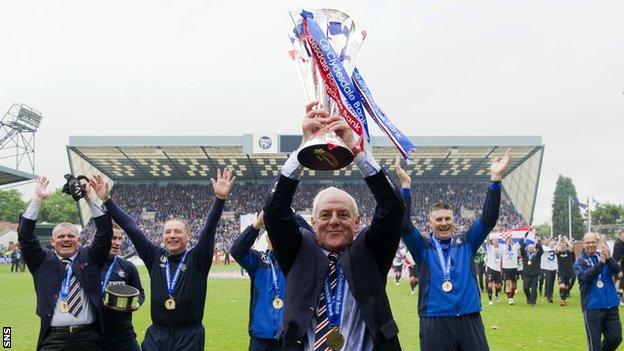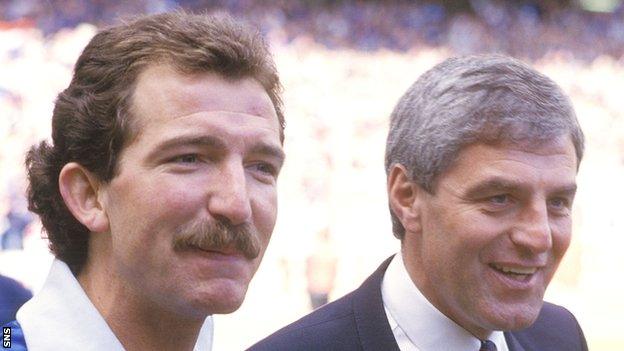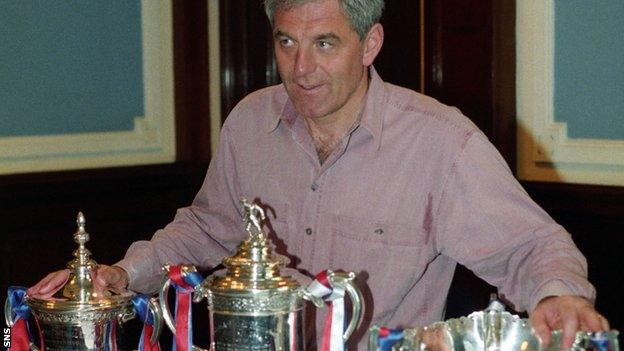Walter Smith: 'No Rangers manager comes close to his achievements'
- Published

Walter Smith signed off as Rangers manager with his 10th league title in 2011
During Walter Smith's second spell as Rangers manager, it was commonplace to see his wife Ethel mingling in the Ibrox media room after games, always with a warm smile.
Some of his grandchildren, too, would dart around the tunnel area, as carefree as if it were their own private space.
In some senses it was. The walls reverberated with Smith's presence and influence. In the modern era, no Rangers manager comes close to the scale of his achievements, or the deeply personal connection he felt to the club.
After five years as assistant manager to Graeme Souness, Smith took charge himself in April 1991 and led Rangers to seven league titles, three Scottish Cups and three League Cups.
That seven-year spell included capturing the treble in 1992-93, steering Rangers to a ninth consecutive title - still a domestic record shared with Celtic - and becoming the first British club to reach the group stages of the Champions League (after Arsenal and Leeds United failed).
When he returned as manager in January 2007, for what turned into four years in charge, he drove the club to three more league titles, two Scottish Cups and three League Cups, as well as the 2008 Uefa Cup final, when Rangers lost to Zenit St Petersburg.
Great among greats
The accumulation of trophies is impressive enough - 21 in all - but so too was the longevity. Only William Wilton, Bill Struth and Scot Symon led Rangers for longer than Smith's cumulative 11 years. But they were men of a very different era, a time when managerial reigns were measured by the decade.
Even still, of all the 16 permanent Ibrox managers, only Struth won more league titles and more Scottish Cups than Smith, and no Rangers manager has lifted the League Cup more often.
The honours elevate Smith - in those 11 years he won 10 titles - but he was also a steady hand during four years in charge of an Everton side that fought relegation amidst cost-cutting, then brought order and self-assurance to a Scotland team left distressed by the draining years of Berti Vogts.
During two years under Smith, a manager guided by an enduring sense of realism, Scotland defeated France and drew with Italy. These raised the esteem of the nation, but the team still fell short of the 2006 World Cup and the 2008 European Championship.
Some Scotland fans struggled to forgive Smith for returning to Rangers - a move he explained by saying the "club has always been in my blood" - but even that was a measure of his capabilities. They understood that under Smith, the national team would likely keep improving.
'Rangers in his blood'

Souness leant on Smith's greater coaching experience in the late 1980s and early 90s
As a manager, he was a product of his time and his circumstances. A limited player at Dundee United, Smith allowed his fascination for the game to take hold. He'd play for the reserves on a Friday then study a game on the Saturday.
That education allowed him to flourish as a coach, but always underpinned by a deep-rooted competitiveness and the kind of flinty authority that brooked no argument.
Smith was forged by his spell as a coach under Jim McLean at United, a time when the Friday five-a-sides against Alex Ferguson and his Aberdeen staff were fiercely contested.
By the time Smith arrived at Ibrox in 1986 to work alongside Souness, he had served with McLean and, at the 1986 World Cup, with Ferguson.
He was different in nature to three of Scottish football's most combustible figures, but it is a measure of Smith's character that he thrived alongside them and retained their lasting friendship and loyalty.
Once a manager himself, players attested to his calmness, his honesty, an air of command - he could wield a glare that seemed capable of halting time itself - and the kind of personality that could rouse people.
Like all successful managers, he grasped psychology in a way that did not need an academic achievement to liberate it. During his second spell at Ibrox, he once handed out the previous season's championship medals to the players in the closing months of the following term to act as an impetus.
Smith succeeded in different eras. Rangers were able to consistently outspend rivals during his first spell, but he possessed the wherewithal to make that work, time and again.
He identified the talent and characteristics in players that would work together in a team, and delivered career-defining years from such differing personalities as Brian Laudrup, Paul Gascoigne, Ally McCoist, Richard Gough and Andy Goram.
The pressure was immense, but Smith didn't flinch. In 2007, he took over a side adrift in the wake of Gordon Strachan's Celtic, but signed shrewdly, knitted together another strong collective, and went on to succeed again.
Smith built sides based on solid foundations that allowed individual ability to flourish. There were low points, and Rangers fans grumbled about European upsets, particularly in the Champions League.
Yet Smith would have acknowledged the root cause of those complaints: the tradition of a club where supporters are raised to expect and demand success, whatever the circumstances.
A manager of substance

Smith is one of only six Rangers managers to have won the treble
His father was a Cambuslang Rangers fan, but Smith's grandfather regularly took him to Ibrox from the family home in Carmyle.
During the years of boardroom strife, Smith was urged to try to intervene and became a non-executive director, then chairman between November 2012 and August 2013.
He reportedly attended one potentially fraught board meeting with a faded photograph of himself as a five-year-old at Ibrox with his grandfather and other members of the Carmyle supporters club, then delivered an emotional speech.
At a time of crisis, when his club appeared cut adrift from all of its old certainties, Smith expressed most coherently why Rangers meant so much to so many. That act alone embodied him, as much as it distinguished him from the various outsiders who had been drawn to Ibrox for their own means.
When the club were lost and vulnerable, few could better articulate the essence of what was missing. As a supporter, a manager, a figurehead, Smith understood Rangers - and that affinity was a lasting accomplice as he climbed to the loftiest of places in their history.